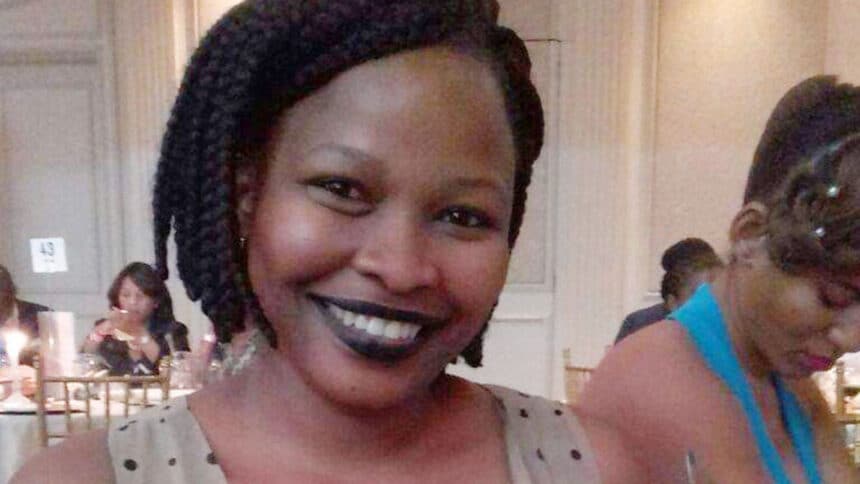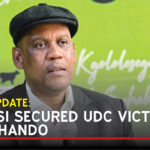“Some are born great, some achieve greatness, and some have greatness thrust upon them.”
These famous words by William Shakespeare, taken from his 17th century romcom play,Twelfth Night, describe 31-year-old Moitshepi Matsheng from Borobadilepe in the Southern District.
A woman of many firsts, the University of Botswana LLB graduate is the first female Chairperson of the Botswana National Youth Council (BNYC), a position she has held since 2019. In the same year, Matsheng was among the first cohort of young Batswana selected for the Obama Leaders for Africa, a programme that seeks to identify exceptional leaders in public, civil society, and the private sector who have a clear issue-focus and who can illustrate the impact of their work.
Furthermore, Matsheng was the first Motswana to receive the Queen’s Young Leaders Award in 2016. She is a board member of D-Prize, an organisation that provides seed funding to new ventures that distribute proven poverty interventions.
She was chosen by former President, Festus Mogae, as a Youth Champion for the Champions for an AIDS-Free Generation.
As part of the Bot50 Independence celebrations in 2016, she was recognised as one of the 50 Batswana Changemakers Under 40 by GabzFM/Mail&Guardian.
Voice Woman sat with the seasoned social innovator, who is the Managing Director and co-Founder of Youth Impact, a youth-led non-governmental organisation (NGO) whose focus is to improve the lives of young people through evidence-based, high-impact health and education programmes.
As today, Friday 22nd March, marks the 10th anniversary of the Gaborone-based NGO, which is in partnership with the governments of Botswana, Namibia and South Africa, indeed Matsheng has good reason to commemorate this milestone for her organisation prides itself on reaching in excess of 200 000 young people through its programmes, across 10 countries.
Matsheng was studying law at the University of Botswana (UB) when she met a Fulbright scholar from America, Noam Angrist, who was conducting research at the institution and, together, they established Youth Impact, formerly known as One Love.
“Angrist and I struck up a conversation around the issues such as high HIV prevalence, of which one of the key drivers is the sugar daddy phenomenon or intergenerational relationships. A mutual friend would later send us the D’PRIZE Girls Education Challenge, an organisation that provides seeding funding to NGOs that are trying to implement proven interventions to scale them up. We also discussed a study in Kenya that showed that when you reveal older partner are risky to young girls, it reduces teenage pregnancy by 28%. We thought that good research is conducted but rarely scaled or tested, so we said let’s adapt this and see if it works. So, we applied for the grant and were successful.”
The grant was a whopping $20k! Bright-eyed and bushy-tailed, the highly ambitious quartet of Matsheng, Noam Angrist Brenda (another Fulbright scholar), and fellow UB student, Unami Moatswi, were ready to impact the world around them albeit with no experience running NGOs.
“At the time, we were meant to do a short-term programme to reach 10 schools. attempted to fundraise through banks but were advised us to register as an organisation in order to access funding. I always say great ideas can be nurtured when you have the right people around you. On 22nd March of that year, we invited over a thousand young UB students to the amphitheater, permanent secretaries from the ministries of youth, education and health, and thereafter we launched the organisation; throngs of people offered to volunteer. The reception was very encouraging and the programme’s focus was the risk of intergenerational relationships for young girls as well as breaking the stigma around sex talk. We started with a small team tasked with breaking the silence and stigma. I was motivated to do this by my own story, having observed that sometimes HIV is not the real killer, silence is.”
Raised by religious grandparents after, Matsheng lost her mother to HIV at the tender age of 6, circa 1999.
“My granddad was the Rev Deacon Joseph Seate Matsheng of the Catholic Diocese of Gaborone. He was a community builder; very much involved in church activities, and he specialised in public administration at the University of Botswana. My loving grandmother was a senior conveyancer at the Attorney General’s Chambers. I grew up in church, which meant that I was active in various areas like the Chiro; I tagged along to pray for prisoners or to whatever community engagements. It was impressed upon me the importance of serving others,” she says.
Matsheng believes her core purpose is to be a builder. “It’s centered around how I add value to people’s lives, to support and encourage others to walk the path that I have been privileged to walk.
My grandfather was very passionate and committed. He encouraged us to be in touch with current affairs, to read extensively, from a young age; he believed that we have to be in this continuous journey to learn.
I picked up a lot of these traits from my old man,” she explains, adding that at UB, she became part of The African Women Leadership Academy (TAWLA), in the company of Dr Mosime, and Dr Mookodi, who inspired her to push the boundaries and express herself.
A year before completing her studies, Matsheng decided to take a 2-year break, much to her grandparents’ dismay.
“They had their reservations. Social entrepreneurship is perceived as unstable; parents might see it as mere volunteerism. I felt that was an opportune time to start seeking partnerships with government and we were learning quite a lot, doing the work around HIV prevention in 2014/15. The following year, we added another programme that centered around education called Teaching at the Right Level – focused on students learning abilities. For example, we discovered that only 10% of standard 5 students can do division. This means that the majority of those students aren’t learning at the level. We did a needs assessment to see where we are in terms of primary schools, particularly looking at Mathematics and literacy. The then PS wanted a cost effective yet innovative programme. Botswana has high enrollment rates of over 90% but the concern is the quality; our programme focuses on grouping students according to their learning abilities.”
Today, Youth Impact has a presence in 8 out of regions across the country. “We have a Memorandum of Understanding with the Ministry of Basic Education to collaborate on the scale-up of ‘Teaching at the Right Level (TaRL)’, a proven approach to improving literacy and numeracy. In addition, Youth Impact’s Advisory Forum is chaired by the former Permanent Secretary of Basic Education. Our sexual and reproductive health program is being introduced in eSwatini and Malawi. We also are supporting the implementation of TaRL in Namibia and Kenya,” she declares, adding during the pandemic, they launched a third programme called Connected, to remain in touch with students during lockdowns, engaging parents to fully appreciate their children’s progress.
As Youth Impact reaches this remarkable 10-year milestone, they have since grown from a tiny team of 4 to a whopping 350.
Additionally, the NGO has cast its net wider. “We grew from just one country, Botswana, now we’re operating in more than 10 countries. We began with just $20 000, now we’re looking at roughly $2 million. That’s quite a big growth point, an inflection point of our organisation. The programmes we’re delivering need to be anchored on rigorous research, so we have a sizeable research team,” she says.
Indeed, Matsheng was born great, has achieved greatness, and has had greatness thrust upon her!
She is a mentor for the UNGWA Africa Program 2020 and an active alumnus of the UB Young Women’s Leadership Club, and was recognised in the Vox.com 2023 Future Perfect 50 list for being actively engaged in reducing HIV transmission in Botswana.

















